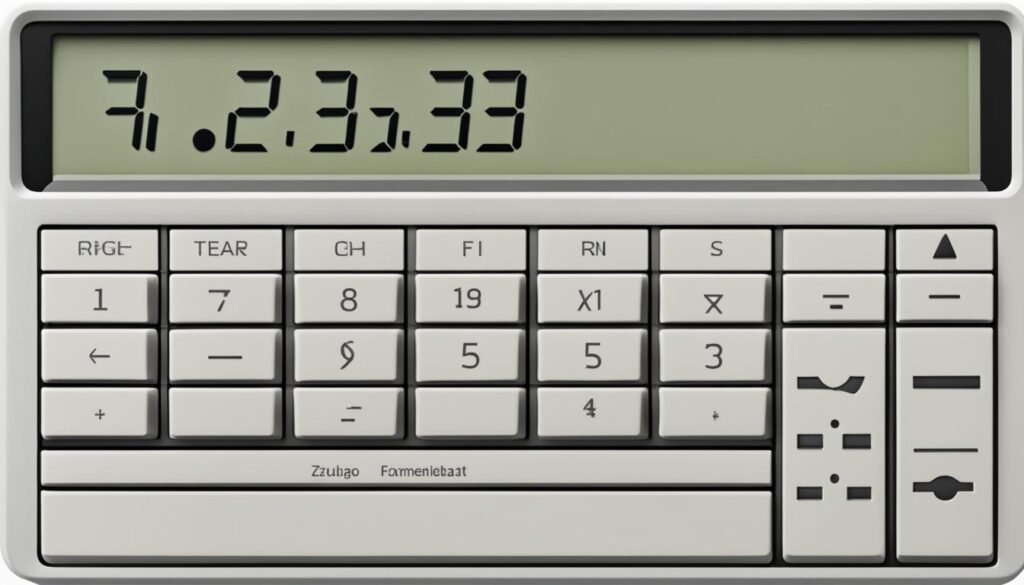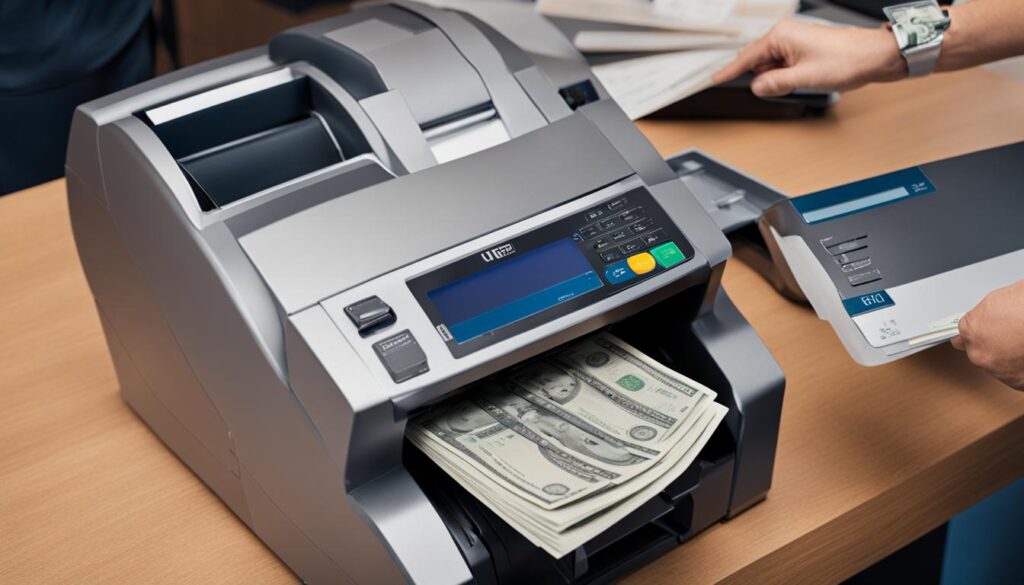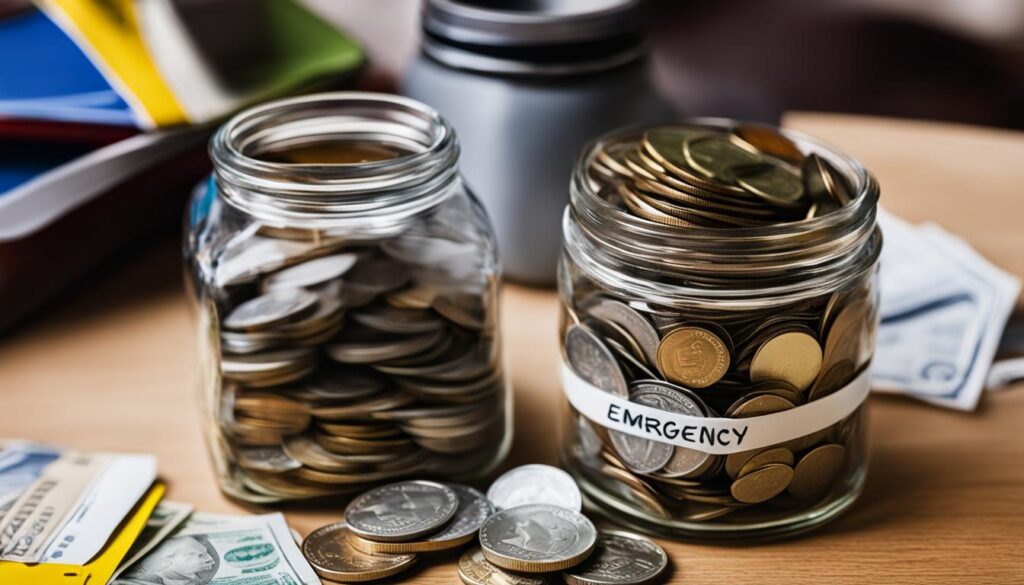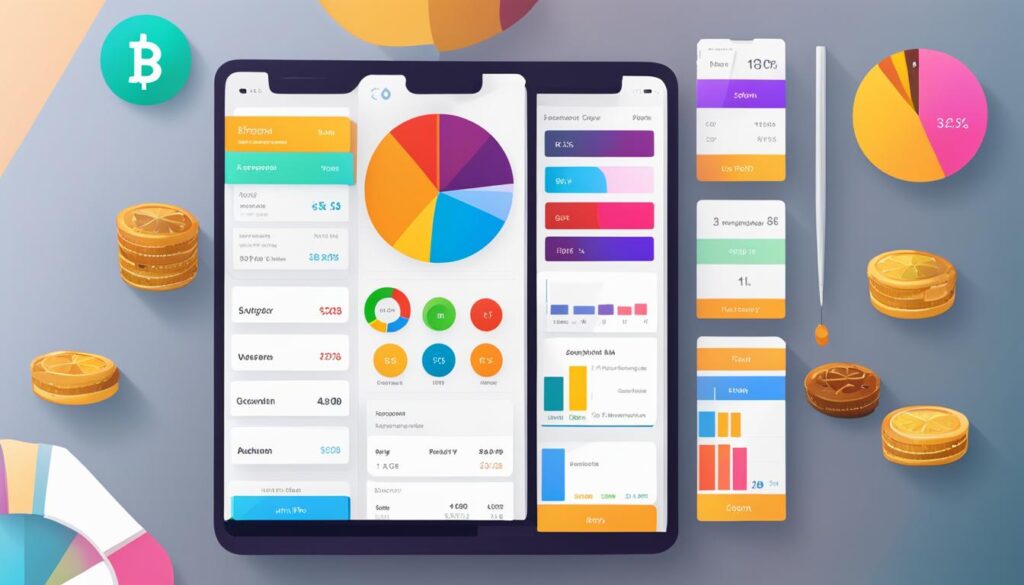Budgeting is often seen as a daunting task, but it is essential for financial freedom. A budget is simply a plan for your money, allowing you to take control and make intentional decisions about how you spend and save. In this article, we will provide expert tips from finance planners to help you master the art of budgeting and achieve your financial goals with ease.
Key Takeaways:
- Create a budget to take control of your finances and make intentional decisions.
- Understand the importance of budgeting in achieving your financial goals and managing your money effectively.
- Consider using a zero-based budgeting method to prioritize your spending and be intentional with your money.
- Budgeting as a couple can strengthen your relationship and improve your financial well-being.
- Plan for different expenses, including both regular and irregular expenses, to avoid surprises and ensure you have enough money set aside.
Why Budgeting is Important
Budgeting plays a vital role in achieving financial success and managing your money effectively. It provides a framework for understanding your financial situation, making informed decisions, and reaching your financial goals. Let’s explore why budgeting is crucial and how it can contribute to your overall financial well-being.
First and foremost, budgeting helps you gain a clear understanding of where your money is going. By tracking your income and expenses, you can identify areas where you may be overspending or not allocating enough funds. This knowledge empowers you to make adjustments and align your spending with your financial priorities.
“Budgeting is the foundation of all financial plans. It gives you control over your money and enables you to direct it toward what’s most important to you.”
– Rachel Cruze, Financial Expert
Furthermore, budgeting enables you to set and work towards your financial goals. Whether it’s saving for a down payment on a house, paying off debt, or planning for retirement, a budget helps you allocate funds strategically and prioritize your financial objectives. It serves as a roadmap to guide your financial decisions and steer you in the direction of long-term success.
Effective money management is another significant benefit of budgeting. When you have a budget in place, you gain greater control over your spending habits. It allows you to be intentional about your expenses, avoid unnecessary purchases, and ensure that you are living within your means. By managing your money wisely, you can avoid debt, build a savings cushion, and achieve financial stability.
Ultimately, budgeting provides you with peace of mind and financial security. It eliminates the stress of living paycheck to paycheck, as you can confidently plan and allocate your funds for both essential and discretionary expenses. By maintaining a balanced budget, you can weather unexpected financial challenges and have the resources to handle emergencies or unexpected expenses when they arise.
Take the first step towards achieving your financial goals by embracing the importance of budgeting. With a solid budget in place, you can gain control over your finances, make progress towards your goals, and pave the way for a brighter financial future.
Creating a Zero-Based Budget

When it comes to budgeting, a zero-based budget is a powerful tool that can help you take control of your finances and make intentional spending decisions. With a zero-based budget, every dollar of your income is allocated to a specific expense or savings goal. This means that your income minus your expenses should equal zero.
By giving every dollar a purpose, you can ensure that none of your hard-earned money goes to waste. This budgeting method helps you prioritize your spending and make intentional choices about where your money goes.
A zero-based budget involves careful planning and tracking of your income and expenses. It requires you to assign every dollar to a category, such as housing, transportation, groceries, debt repayment, or savings. This way, you can allocate your funds based on your priorities.
Here’s an example of how a zero-based budget can be structured:
| Category | Budget Allocation |
|---|---|
| Income | $5,000 |
| Housing | $1,500 |
| Transportation | $500 |
| Groceries | $400 |
| Debt Repayment | $1,000 |
| Savings | $600 |
| Other Expenses | $1,000 |
This table illustrates an example budget where every dollar of the $5,000 income is allocated to various categories. As you can see, the total budget allocation equals the total income, resulting in a zero balance.
Creating a zero-based budget not only helps you minimize unnecessary expenses but also encourages you to identify areas where you can cut back and save more. It allows you to align your spending with your financial goals and make intentional choices about your money.
Remember to regularly review and adjust your zero-based budget as needed. Life circumstances and financial goals may change over time, so it’s important to ensure your budget remains relevant and effective in helping you achieve your desired outcomes.
The Power of Budgeting Together

If you are in a relationship or married, budgeting together can have a significant positive impact on your financial well-being. It goes beyond just managing money; it strengthens the bond and builds trust between you and your partner.
By having a financial accountability partner, you both can stay motivated and stay on track with your budgeting goals. When you have someone to hold you accountable, you are more likely to make responsible financial decisions and stick to your budget. This partnership promotes financial transparency and helps avoid conflicts that can arise from financial disagreements.
Setting shared financial goals is an essential aspect of budgeting as a couple. Discussing and aligning your objectives, such as saving for a down payment on a house or planning for a dream vacation, allows you both to work together towards achieving them. Having these shared goals not only provides a sense of purpose but also strengthens your commitment to mutual financial success.
Regularly reviewing your budget and financial progress together is the key to maintain financial harmony. By having open and honest conversations about your income, expenses, and savings, you can make adjustments as needed and ensure that you are both on the same page when it comes to your finances. This practice promotes a healthy financial partnership and prevents any surprises or misunderstandings down the road.
Remember, budgeting as a couple involves collaboration, compromise, and effective communication. It is essential to respect each other’s perspectives and decisions when it comes to managing your finances. By working together towards your shared financial goals, you can build a solid financial foundation and create a better future for both of you.
Image:
Planning for Different Expenses

When creating a budget, it’s crucial to account for all your expenses. This includes both your regular monthly expenses and irregular expenses. Monthly expenses typically include rent or mortgage payments, utilities, groceries, and transportation costs. However, irregular expenses can catch you off guard if you’re not prepared for them.
Irregular expenses encompass various occasions such as car maintenance, vacations, and birthdays. Planning ahead for these special occasions and unexpected costs is essential to avoid financial surprises and ensure you have enough money set aside to cover them.
By factoring in your monthly expenses and budgeting for irregular expenses, you can maintain financial stability and prevent unnecessary stress. Having a clear understanding of your expenses allows you to allocate your funds wisely and make informed financial decisions. Whether it’s setting aside a portion of your income each month or creating a separate savings fund for irregular expenses, planning ahead is key.
Prioritizing Debt Repayment
If you have debt, it is crucial to make debt repayment a priority in your budget. By focusing on paying off your debts, you can take significant steps towards achieving financial freedom and improving your overall financial well-being.
One effective debt repayment strategy is the debt snowball method. This method involves paying off your smallest debts first while making minimum payments on your larger debts. As you eliminate each small debt, you gain momentum and motivation to tackle larger debts. This strategy not only helps you become debt-free faster but also provides a sense of accomplishment along the way.
Here’s how the debt snowball method works:
- List all your debts, starting from the smallest balance to the largest.
- Allocate a certain amount of money from your budget for debt repayment every month.
- Make minimum payments on all your debts except the smallest one.
- Put extra money towards the smallest debt until it is paid off.
- Once the smallest debt is paid off, take the amount you were paying towards it and apply it to the next smallest debt.
- Repeat this process until all your debts are paid off.
By following this method, you create a snowball effect that gains momentum as you pay off each debt. Not only does this method provide a clear plan for debt repayment, but it also helps you stay motivated and focused on your financial goals.
Example:
Let’s take a look at an example to illustrate the debt snowball method:
| Debt | Balance | Minimum Payment |
|---|---|---|
| Credit Card A | $2,000 | $50 |
| Credit Card B | $5,000 | $100 |
| Car Loan | $10,000 | $200 |
In this example, you would start by making minimum payments on all three debts. Let’s say you allocate an additional $300 per month towards debt repayment.
Using the debt snowball method, you would focus on paying off Credit Card A first. With the minimum payment of $50 and the additional $300, you would be able to pay off Credit Card A in just a few months. Once that debt is paid off, you can redirect the $350 towards Credit Card B while still making minimum payments on the car loan. This process continues until all the debts are eliminated.
By prioritizing debt repayment and utilizing strategies like the debt snowball method, you can take control of your financial situation and work towards a debt-free future. Eliminating debt not only frees up more money in your budget but also reduces the financial stress and allows you to focus on your other financial goals.
Trimming the Budget
Sometimes, it is necessary to make budget cuts to save money. By prioritizing expenses and trimming unnecessary spending, you can free up extra money to put towards savings or debt repayment. Here are some effective strategies for trimming your budget:
1. Reduce Dining Out
One way to save money is by cutting back on dining out. Instead of eating at restaurants frequently, try cooking meals at home. Not only will this help you save money, but it can also be a fun and creative way to explore new recipes.
2. Limit Entertainment Expenses
Entertainment expenses can quickly add up, but there are ways to enjoy leisure activities on a budget. Consider alternatives such as movie nights at home, free community events, or utilizing streaming services instead of expensive cable packages.
3. Avoid Non-Essential Shopping
To save money, prioritize your expenses and avoid non-essential shopping. Before making a purchase, ask yourself if it is something you truly need. By reducing impulse purchases, you can allocate more funds towards your financial goals.
Remember, budget cuts are about making conscious choices to align your spending with your priorities. By regularly reevaluating your budget and making adjustments as needed, you can stay on track and achieve your financial objectives.
Trimming the budget allows you to prioritize your expenses, save money, and take control of your financial future. By following these strategies, you can make the most of your income and work towards achieving your financial goals.
Automating Bill Payments

Automating bill payments is a convenient and efficient way to manage your finances. By setting up auto drafts for your recurring bills, you can save time and eliminate the stress of remembering due dates. Not only does this ensure that your bills are paid on time, but it also helps you maintain a healthy cash flow by managing your expenses effectively.
With automated bill payments, you no longer have to worry about missing a payment or incurring late fees. Once you set up the auto drafts, your bills will be paid automatically from your designated account on their due dates. This allows you to focus on other important aspects of your life without the constant worry of bill payment deadlines.
Before setting up automated bill payments, it is critical to maintain a close eye on your account balance. This way, you can ensure that you have sufficient funds available to cover all your bills, especially when multiple bills are due at once. Keeping track of your account balance helps you avoid potential overdrafts and unnecessary fees.
Automating your bill payments not only saves you time and stress but also helps you stay on top of your financial responsibilities. By effectively managing your billing process, you can maintain a healthy cash flow and ensure that your bills are paid on time, contributing to your overall financial well-being.
Setting and Tracking Goals
![]()
Setting goals is essential for staying motivated and making progress with your finances. Whether it’s paying off debt, building an emergency fund, or saving for retirement, having clear goals gives you something to work towards.
When setting financial goals, it’s important to make them specific, measurable, achievable, relevant, and time-bound (SMART). This means defining exactly what you want to achieve, determining how you will measure your progress, ensuring that your goals are realistic and relevant to your financial situation, and setting a deadline for achieving them.
Tracking your progress towards your financial goals is just as important as setting them. It allows you to assess how far you’ve come, make any necessary adjustments to your budget or savings plan, and celebrate milestones along the way.
To effectively track your goals, consider using progress tracking methods like:
- Regularly reviewing your budget and expenses to ensure you’re staying on track
- Maintaining a financial journal or spreadsheet to record your progress
- Using personal finance apps or online tools that offer goal tracking features
By consistently monitoring your progress and making any needed adjustments, you can stay motivated and ensure that you’re making steady progress towards your financial goals.
Miscellaneous Expenses and Contingencies

When creating a budget, it’s crucial to account for unexpected expenses that may arise throughout the month. These miscellaneous expenses can throw off your budget if not properly accounted for, leading to financial stress and the need to dip into other budget categories. To maintain control over your spending and avoid any budgetary surprises, it is important to include a dedicated category for miscellaneous expenses.
Miscellaneous expenses can include anything from car repairs to medical bills to home maintenance costs. By allocating a specific portion of your budget to these miscellaneous expenses, you can be prepared for any surprises that may arise. This not only helps you avoid financial strain but also allows you to maintain your progress towards your financial goals.
If certain expenses consistently fall into the miscellaneous category, it might be worth considering creating a separate budget line for them. This will provide even more clarity and control over how your money is allocated and spent.
Additionally, having a budget contingency plan is essential. Budget contingencies refer to setting aside a certain amount of money each month to deal with unforeseen circumstances or emergencies. These funds serve as a safety net and can cover unexpected expenses that go beyond the miscellaneous category.
To establish a budget contingency plan, it is recommended to build an emergency fund. An emergency fund is a savings account specifically designed to cover unexpected expenses or income disruptions. The general rule of thumb is to have at least three to six months’ worth of living expenses saved in your emergency fund. This ensures that you have enough financial cushion to handle unexpected situations without relying on credit cards or loans.
By including a miscellaneous category in your budget and creating a budget contingency plan with an emergency fund, you can handle unexpected expenses with ease and maintain your financial stability.
Using Budgeting Tools

Budgeting tools play a crucial role in simplifying the budgeting process and helping individuals stay organized with their finances. Whether you prefer using apps or online platforms, these tools provide a host of features to streamline your budgeting journey, making it easier than ever to achieve your financial goals.
One of the key advantages of using budgeting tools is the ability to create and track your budget in a user-friendly interface. You can enter your income, set spending limits for different categories, and monitor your expenses in real-time. This helps you stay on top of your finances and make informed decisions about your spending.
Additionally, budgeting tools often come with insightful dashboards and reports that provide a comprehensive overview of your financial situation. These visual representations help you analyze your spending patterns, identify areas where you can cut back, and make adjustments to optimize your budget.
Furthermore, budgeting tools offer helpful features like alert notifications, reminders for bill payments, and goal-setting functionalities. These features help keep you accountable and ensure that you stay on track with your financial plans.
When selecting a budgeting tool, consider features such as synchronization across multiple devices, data security, and integration with your bank accounts. The right tool should align with your specific needs and offer a seamless user experience.
Now, let’s take a closer look at some popular budgeting apps and tools:
| App Name | Description | Platform |
|---|---|---|
| Mint | Mint is a comprehensive personal finance app that allows you to track your spending, monitor your investments, and set financial goals. | iOS, Android |
| You Need a Budget (YNAB) | YNAB emphasizes the concept of “giving every dollar a job” and provides a systematic approach to budgeting for optimal financial management. | iOS, Android |
| PocketGuard | PocketGuard helps you track your expenses, categorize your transactions, and set saving goals, all in one user-friendly interface. | iOS, Android |
| Personal Capital | Personal Capital is an all-in-one tool that combines budgeting, investment tracking, and retirement planning features to help you achieve long-term financial success. | iOS, Android |
So, whether you’re looking for a comprehensive financial management app or a simple budget tracking tool, there are plenty of options available to suit your needs. Explore these apps and find the one that resonates with your financial goals and preferences.
Budgeting Apps Comparison
| Feature | Mint | You Need a Budget (YNAB) | PocketGuard | Personal Capital |
|---|---|---|---|---|
| Expense Tracking | ✓ | ✓ | ✓ | ✓ |
| Budget Creation | ✓ | ✓ | ✓ | ✓ |
| Goal Setting | ✓ | ✓ | ✓ | ✓ |
| Investment Tracking | ✓ | ✓ | – | ✓ |
| Data Security | ✓ | ✓ | ✓ | ✓ |
| Platform | iOS, Android | iOS, Android | iOS, Android | iOS, Android |
Remember, the effectiveness of a budgeting app or tool ultimately depends on your commitment to using it consistently and making informed financial decisions based on the insights it provides. So, choose a tool that fits your preferences and start leveraging its features to take control of your finances.
Conclusion
Budgeting is a foundational skill for achieving financial success and long-term financial planning. By implementing expert finance planner tips, such as creating a zero-based budget, prioritizing debt repayment, and tracking your expenses, you can gain control over your finances and work towards your financial goals. It is important to remember that budgeting is not a one-time task, but an ongoing process that requires regular review and adjustment.
By consistently monitoring your budget and making necessary changes, you can ensure that your financial plan remains relevant and effective. This will help you stay on track and adapt to any changes in your income, expenses, or financial goals. Ultimately, budgeting empowers you to make informed decisions about how you spend and save your money, paving the way for long-term financial stability and success.
As you embark on your budgeting journey, be patient with yourself and focus on progress rather than perfection. It may take time to develop the habit of budgeting and to see significant results, but every small step counts. With dedication and a commitment to financial responsibility, you can achieve your financial goals and create a secure and prosperous future for yourself and your loved ones. Start budgeting today and take control of your financial well-being.
Also Refer : Your Trusted Partner In Lending – Driveway Finance Corp.
FAQs
Q: What is a budget planner?
A: A budget planner is a tool or system used to track income, expenses, and savings to help individuals manage their finances and allocate money strategically.
Q: How can a budget planner help with personal finance management?
A: A budget planner can provide a clear overview of income and expenses, assist in setting financial goals, help identify areas for saving, and aid in creating a practical budget plan.
Q: What are some tips for effective budget planning?
A: Effective budget planning involves tracking all expenses, prioritizing savings and debt payments, regularly reviewing and adjusting the budget, and using tools such as budget planners or trackers.
Q: Are there any recommended budget planning tools?
A: Yes, there are various budget planning tools available, including online budget planners, envelope budgeting systems, spreadsheet templates, and financial management apps like NerdWallet.
Q: How can I create a budget plan?
A: To create a budget plan, start by listing all sources of income and fixed expenses. Then, allocate funds for variable expenses, savings, and debt payments, ensuring that the plan reflects your financial goals.
Q: What is envelope budgeting and how does it work?
A: Envelope budgeting is a method where you allocate specific amounts of money to different categories of expenses and keep these funds in separate envelopes or virtual categories, ensuring that you don’t overspend in any category.
Q: Can’t I just use a free budget planner instead of a premium one?
A: Absolutely. There are many free budget planners and budgeting tools available that offer comprehensive features for effective budget management without requiring a premium subscription.
Q: How can budget planning help in staying debt-free?
A: Through effective budget planning, individuals can prioritize debt payments, avoid unnecessary expenses, and allocate funds towards reducing debt, thereby working towards a debt-free financial status.
Q: Is budget planning suitable for people with varying incomes?
A: Yes, budget planning can be adapted for varying incomes by prioritizing essential expenses, setting aside emergency funds, and adjusting discretionary spending based on income fluctuations.
Q: What role does budget planning play in improving financial well-being?
A: Budget planning plays a crucial role in improving financial well-being by promoting mindful spending, savings, and debt management, ultimately helping individuals to achieve financial stability and security.













